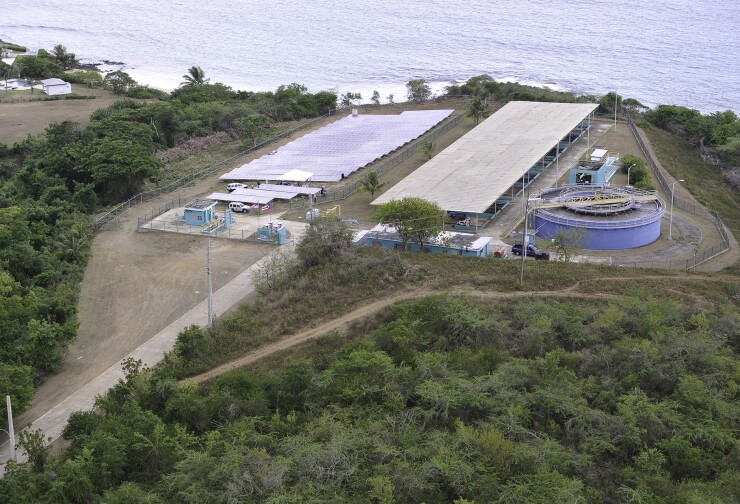
The Puerto Rico Aqueduct and Sewer Authority said it wouldn't have the money to make its debt payments in the next 10 years unless it can boost revenue or cut costs.
PRASA president Alberto Lázaro Castro told the Puerto Rico Oversight Board Friday that it faces a $3.9 billion shortfall in the next 10 fiscal years. Of this $1.4 billion would be for debt service. An additional $2.5 billion would be for its capital program, he said. PRASA has $4 billion of bond debt outstanding.
When a board member asked PRASA chief financial officer Efraín Acosta to confirm that the authority couldn't make all debt service without further borrowing, Acosta agreed.
Lázaro said the authority was examining four options.
First, it could execute operational initiatives to reduce costs and increase revenues. An example of this would be to change water meters to reduce non-revenue water. Another example would be to use Puerto Rico's Act 66 of 2014 or other labor reform laws.
Second, PRASA could consider some form of "debt restructuring."
"We have to discuss whether Act 68 – debt securitization – is the path to use or if there are other options that could be used," Lázaro said. He added that Puerto Rico Oversight, Management and Debt Enforcement Act was one possible alternative approach.
Third, PRASA could obtain new financing. It is in discussions concerning this.
Finally, the authority could raise rates.
The solution will probably involve a balance between the authority's several stakeholders, Lázaro said.
Lázaro said the authority's rate increase of 2014 was meant to cover operating costs but not to cover the costs of the capital improvement program. The authority had planned to use bonds to pay for the capital improvement plan.
As of right now, without market access, PRASA isn't doing any capital projects, he said.
The authority has signed forbearance agreements with the U.S. Environmental Protection Agency's state revolving funds and the U.S. Department of Agriculture. These agreements have caused the authority to lose access to federal funds.
PRASA has been hit by the economic crisis, emigration from the island, downgrades deep into speculative grades, and its loss of market access, Lázaro told the board.
The rating agencies downgraded the authority because of its connection to the troubled Puerto Rico government and not to its own indigenous problems, PRASA's outside legal counsel, Juan Ram-n Cancio said.
When PRASA tried to sell about $750 million in bonds in late summer of 2015, the authority got about $500 million in orders, Lázaro said.
However, right before the deal was to close Puerto Rico filed a brief with the U.S. Supreme Court, seeking to defend its public corporation bankruptcy law, Ram-n Cancio said. In the brief, Puerto Rico said all of its public corporations were bankrupt or couldn't pay their debt. This undercut the market's willingness to buy PRASA's bonds and the authority didn't sell the bonds.
PRASA plans to submit a fiscal plan to the Puerto Rico Oversight Board before the end of this year. It is hoping that by the end of December the federal government will extend its forbearance agreements. It wants the board to approve its plan by mid-January.
Lázaro seemed to say that PRASA needed to submit a fiscal improvement plan with Puerto Rico's Financial Advisory Authority and Fiscal Agency by Feb. 1.





